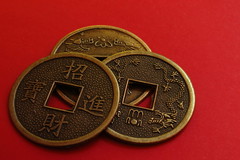Divination (from Latin divinare "to foresee, to be inspired by a god"[2], related to divinus, divine) is the attempt to gain insight into a question or situation by way of a standardized process or ritual, says Wikipedia.[3]
The Book of Changes, I Ching, is one of the oldest of the Chinese classic texts.[1] The book contains a divination system comparable to Western geomancy or the West African Ifá system. In Western cultures and modern East Asia, it is still widely used for this purpose.
Divination can be seen as a systematic method with which to organize what appear to be disjointed, random facets of existence such that they provide insight into a problem at hand.
The text of the Book of Changes is a set of oracular statements represented by 64 sets of six lines each called hexagrams (卦 guà). Each hexagram is a figure composed of six stacked horizontal lines (爻 yáo), each line is either Yang (an unbroken, or solid line), or Yin (broken, an open line with a gap in the center).
The oldest method for casting the hexagrams, using yarrow stalks, is a biased random number generator, so the possible answers are not equiprobable. While the probability of getting either yin or yang is equal, the probability of getting old yang is three times greater than old yin.
The yarrow stalk method was gradually replaced during the Han Dynasty by the three coins method. Using this method the imbalance in generating old yin and old yang was eliminated.

No comments:
Post a Comment